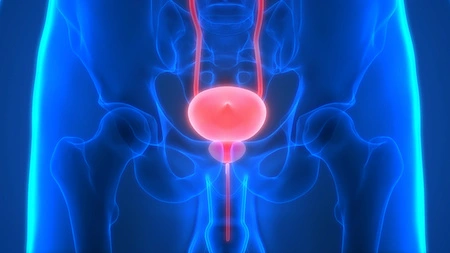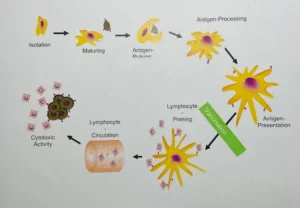
Prostate Cancer treatment with Dendritic Cells
We organize your Prostate Cancer Treatment with Dendritic Cells in Germany
Learn about Prostate Cancer Treatment with Dendritic Cells in Germany. Prostate cancer treatment involves various approaches to manage and fight the disease. If you or a loved one has been diagnosed, it’s important to explore all available options.Germany is known for its advanced medical technology and expertise, offering innovative treatments for prostate cancer. We organize your treatment of prostate cancer with dendritic cells in Germany. From minimally invasive surgeries, to cutting-edge radiation therapy and dendritic cell therapy, Germany provides world-class care.
Understanding these options can help patients make informed decisions and feel confident in their treatment journey. Let’s explore the availability for prostate cancer treatment with dendritic cells in Germany. Read more about dendritic cells here
What is Prostate Cancer?
Prostate cancer is a type of cancer that affects the prostate, a small gland in men responsible for producing some of the fluid that makes up semen. It’s one of the most common types of cancer in men, especially as they age. Prostate cancer often grows slowly and may not cause serious problems initially.However, if left untreated, it can spread to other parts of the body, such as the bones or lymph nodes, becoming more dangerous.
What happens if you are diagnosed with prostate cancer?
Current options of prostate cancer treatment in Germany, vary depending on the stage and severity. They include active surveillance (monitoring the cancer closely), dendritic cell therapy, surgery to remove the prostate, radiation therapy, hormone therapy, and in more advanced cases, chemotherapy.Recently, newer treatments like immunotherapy (dendritic cell therapy) and targeted therapies are also being explored to help the body fight the cancer more effectively. Each treatment is personalized based on individual needs and the progression of the cancer.
If you’re diagnosed with prostate cancer, your doctor will guide you through a series of steps to determine the best course of action. Here’s what typically happens:
Staging and Grading: After diagnosis, your doctor will determine how advanced the cancer is (its “stage”) and how aggressive it appears (its “grade”). This helps identify whether the cancer is confined to the prostate or has spread to other parts of the body.
Now let’s proceed to the treatment options for prostate cancer in Germany.
Explore the Prostate Cancer Treatment Options in Germany
Treatment Plan: Based on the stage and your overall health, your doctor will discuss prostate cancer treatment possibilities. These may include:- Active Surveillance: If the cancer is slow-growing, monitoring it closely with regular check-ups may be suggested.
- Surgery: Removing the prostate (prostatectomy) can be an option for cancers that haven’t spread.
- Radiation Therapy: This can target and kill cancer cells.
- Hormone Therapy: Used to reduce hormone levels that fuel cancer growth.
- Chemotherapy: Chemotherapy or targeted therapies might be used for advanced cases.
- IRE Electro-chemotherapy: IRE irreversible electro-portation with chemotherapy
- ECT Electro-chemotherapy: ECT – local chemotherapy combined with IR-ECT (electro sondes and Keytruda)
- Immunotherapy: Dendritic Cell Therapy helps the body recognize and attack harmful invaders like cancer cells.
Emotional and Support Care: You may also receive emotional support, guidance on lifestyle changes, and access to support groups.
Regular follow-ups are crucial to monitor the effectiveness of treatments and manage side effects. The first choice depending on the stage patients with crpc should be prostate cancer treatment with dendritic cells in Germany.
Immunotherapies for Cancer available in Germany
Immunotherapies for cancer treatment fall into several main categories, each utilizing different mechanisms to boost the body’s immune response to fight cancer cells. Below are the major types of immunotherapies:1. Immune Checkpoint Inhibitors
– Mechanism: These drugs block proteins that prevent immune cells (T cells) from attacking cancer cells. By inhibiting these “checkpoints,” immune cells are unleashed to destroy cancer. Common Targets:
– PD-1 (Programmed Cell Death-1): Pembrolizumab (Keytruda), Nivolumab (Opdivo)
– PD-L1 (Programmed Death-Ligand 1): Atezolizumab (Tecentriq), Durvalumab (Imfinzi), Avelumab (Bavencio)
– CTLA-4 (Cytotoxic T-Lymphocyte-Associated Protein 4): Ipilimumab (Yervoy)
2. CAR T-Cell Therapies (Chimeric Antigen Receptor T-Cell Therapy)
– Mechanism: This therapy involves modifying a patient’s T cells to express a receptor specific to cancer cells, allowing the T cells to recognize and destroy cancer when infused back into the patient. Examples:
– Tisagenlecleucel (Kymriah) for certain types of leukemia and lymphoma
– Axicabtagene ciloleucel (Yescarta) for large B-cell lymphoma
– Lisocabtagene maraleucel (Breyanzi) for large B-cell lymphoma
3. Monoclonal Antibodies
– Mechanism: These lab-engineered antibodies can recognize specific proteins on cancer cells, either marking them for destruction by the immune system or delivering toxins/radiation directly to the cells. Examples:
– Rituximab (Rituxan): Targets CD20 on B cells, used for non-Hodgkin lymphoma.
– Trastuzumab (Herceptin): Targets HER2-positive breast and gastric cancers.
– Bevacizumab (Avastin): An anti-VEGF antibody used to inhibit angiogenesis in various cancers.
4. Cytokines
– Mechanism: These proteins (interferons or interleukins) stimulate the immune system to fight cancer. Examples:
– Interleukin-2 (IL-2, Proleukin): Stimulates T cells and is used in melanoma and renal cell carcinoma.
– Interferon-alpha: Used to treat melanoma, renal cell carcinoma, and certain leukemias.
5. Oncolytic Virus Therapies
– Mechanism: This involves using viruses that are genetically modified to infect and kill cancer cells, while also stimulating the immune system. Example:
– Talimogene laherparepvec (T-VEC or Imlygic): Used for melanoma.
6. Bispecific T-cell Engagers (BiTEs)
– Mechanism: BiTEs are engineered to engage both cancer cells and immune cells (T cells) simultaneously, bringing them into proximity for effective killing of the cancer cells. Example:
– Blinatumomab (Blincyto): Engages CD19 on B cells and T cells for acute lymphoblastic leukemia (ALL).
7. Adoptive Cell Transfer (ACT)
– Mechanism: This therapy involves harvesting a patient’s immune cells, expanding them or modifying them in the lab, and reinfusing them to fight cancer. This includes CAR T-cell therapy but can involve other types of T cells.Example:
– Tumor-infiltrating lymphocytes (TIL) therapy: Used in clinical trials for various cancers, but not widely FDA-approved beyond specific uses like CAR-T.
8. Dendritic Dell Therapy
The dendritic cell therapy have been transformative in treating various types of cancers, but showed promising results in the treatment of prostate cancer. Unfortunately, you won’t find so many clinical trials out there.
Prostate Cancer Treatment with Dendritic Cells or dendritic cell therapy is not yet approved by the FDA in the USA.
What is the life expectancy of a man with prostate cancer?
Prostate cancer can sometimes be cured, but it depends on several factors such as the stage at diagnosis, the aggressiveness of the cancer, and overall health of the patient.Hence, when caught early—while it’s still confined to the prostate—there’s a high chance of successful treatment. In such cases, surgery or radiation therapy can often eliminate the cancer completely.
However, once prostate cancer has spread beyond the prostate, it becomes more challenging to cure. Advanced treatments like hormone therapy, chemotherapy, and newer options like immunotherapy such as dendritic cell therapy can help control the cancer, but they may not fully eliminate it.
In many cases, prostate cancer grows very slowly, so even if it can’t be fully cured, it can often be managed for many years without significantly impacting quality of life.
As a result, early detection and timely treatment improve the chances of cure or long-term control.

New approach: Cellbased immunotherapy for prostate cancer
Explore new Prostate Cancer Treatment with Dendritic Cells
Dendritic cell therapy is an innovative approach for prostate cancer treatment by using the body’s own immune system to fight cancer cells. Dendritic cells are a type of immune cell that helps the body recognize and attack harmful invaders like cancer cells.Therefore, in Prostate Cancer Treatment with Dendritic Cells, these cells are collected from a patient’s blood, then “trained” in a lab to identify prostate cancer cells. Once prepared, the cells are reintroduced into the patient’s body, where they stimulate an immune response to target and destroy cancer cells.
However, dendritic cell therapy represents a promising advancement, but it is usually reserved for cases where other treatments have been less effective. Dendritic cell therapy for prostate cancer is one of best additionally treatment option which is available in Germany.
Most important medical indications for Dendritic Cell Therapy
Dendritic cells (DCs) have shown promising potential in treating various medical conditions, particularly in cancer immunotherapy. As a result, they are specialized immune cells that help initiate the body’s immune response by presenting antigens to T-cells, which then target and destroy foreign invaders, such as cancer cells.However, here’s a list of medical indications where dendritic cell therapy have been studied:
Medical Indications for dendritic cell therapy in Germany:
Cancer:
- Prostate Cancer
- Renal Cell Carcinoma
- Melanoma
- Breast Cancer
- Pancreas Cancer
- Ovarian Cancer
- Lung Cancer
- Glioblastoma (Brain tumor)
- Colon cancer
Read here: all about dendritic cell therapy on Wikipedia.
Read here: about dendritic cells (DC’s) on Wikipedia
Understanding Electrochemotherapy (ECT) for Prostate Cancer
Electrochemotherapy (ECT) is an emerging cancer treatment that combines chemotherapy with electrical pulses to enhance the effectiveness of anti-cancer drugs. Originally used for treating skin tumors, ECT is now being explored for deeper cancers, including prostate cancer. This technique shows promise for patients seeking minimally invasive alternatives to surgery or radiation.
In Electrochemotherapy (ECT), a chemotherapy drug—often bleomycin or cisplatin—is first injected directly into the tumor. Once the drug reaches the cancer cells, short, high-voltage electric pulses are applied to the tumor area using specialized electrodes. These pulses temporarily open up the cell membranes, a process known as electroporation. However, this allows the chemotherapy drug to penetrate the cancer cells more effectively, increasing its ability to destroy them.
For prostate cancer, Electrochemotherapy (ECT) is used in Germany since years now , and studies suggest it could become a valuable option, particularly for localized tumors or cases where conventional treatments are not suitable.
Hence the procedure is performed under general anesthesia and is typically guided by imaging technologies such as ultrasound or MRI to ensure precision. Since Electrochemotherapy (ECT) targets only the tumor site, it minimizes damage to surrounding healthy tissue and often results in fewer side effects compared to traditional therapies.
Electrochemotherapy (ECT) is especially attractive for patients who are not candidates for surgery due to age or other health concerns. It may also serve as a salvage treatment when other therapies have failed. While not yet a standard of care for prostate cancer, Electrochemotherapy (ECT) is gaining attention in the medical community for its potential to improve patient outcomes with reduced complications.
Electrochemotherapy (ECT) and dendritic cell therapy can work synergistically to enhance cancer treatment. However, Electrochemotherapy (ECT) destroys tumor cells and causes them to release cancer antigens, which are substances that the immune system can recognize.
Dendritic cell therapy uses immune cells that are specially trained to identify these antigens and trigger a targeted immune response. Therefore, when combined, Electrochemotherapy (ECT) increases the availability of tumor antigens, while dendritic cells boost the body’s ability to detect and attack cancer cells.
This combination may improve long-term cancer control by not only shrinking the tumor but also stimulating the immune system to prevent recurrence. For patients, the benefit lies in a more comprehensive and potentially durable treatment approach that addresses both local and systemic disease.
In conclusion, electrochemotherapy (ECT) offers a novel, targeted approach to treating prostate cancer by combining the strengths of local chemotherapy and electrical stimulation. With continued study and refinement, it already became an important option in the personalized treatment plans for prostate cancer patients. Especially, when you combine Electrochemotherapy (ECT) with dendritic cell therapy.
Prostate Cancer Treatment in Germany
Place of treatment: GermanyThe dendritic cell therapy program takes 9 days and includes the following steps:
1.) Arrival on day 1
2.) Consultation appointment with the supervising doctor for the prostate cancer treatment with dendritic cell therapy in Germany. Blood withdrawal on day 2 and vitamin infusion. This takes about 2 hrs. After you can leave.
3.) You return to clinic on the 9th day to get your dendritic cell therapy by injection in your belly fat and a vitamin B12 infusion plus vitamin D3 injection. After you can leave back home.
You either day 9 days (10 days if you arrive 1 day earlier) in a beautiful area or fly in and out for your appointment.
You also can get a medical second opinion from us for Prostate Cancer Treatment with Dendritic Cells first.

Find a clinic for Prostate Cancer Treatment with Dendritic Cells in Germany
Germany is renowned for its advanced medical treatments and state-of-the-art facilities, making it a top destination for patients seeking cutting-edge therapies like dendritic cell therapy. One of the leading organizations in this field is GermanyHealth.
However, our patient service provides comprehensive support for international patients seeking treatment of prostate cancer treatment with dendritic cells in Germany. Patients receiving our VIP patient service if they book prostate cancer treatment with dendritic cells.
Request now Prostate Cancer Treatment with Dendritic Cells and Book later!
Prostate Cancer Treatment with Dendritic Cells in Germany.
Call or WhatsApp: 0049 151 5660 7300